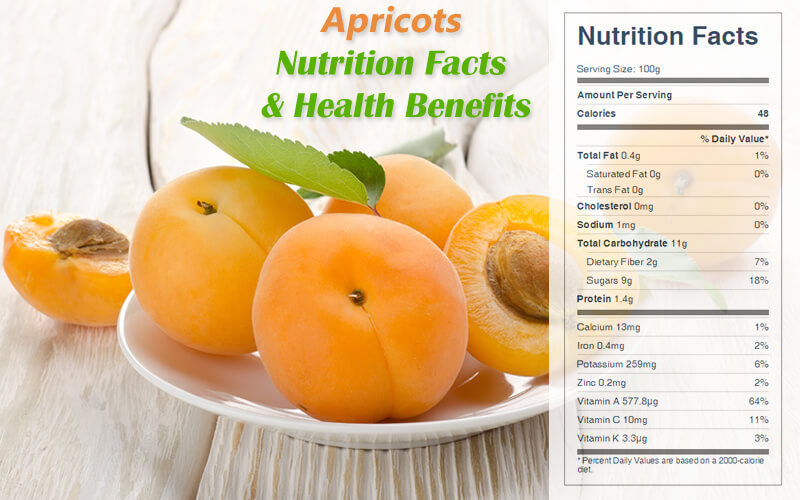Apricots Nutrition Facts & Health Benefits
The apricot has been cultivated for at least 5,000 years, originating in China. They have a rich phytochemical composition, giving them strong antioxidant properties. Here are the nutrition facts and health benefits of apricots.
The nutritional value of raw apricots
In a 100-gram amount, raw apricots supply 48 calories and are composed of 11% carbohydrates, 1% protein, less than 1% fat, and 86% water. Raw apricots are a moderate source of vitamin A and vitamin C.
Three medium raw apricots provide 51 calories, 11.8 grams of carbohydrate, 1.5 g protein, 0.4 g fat, 2.5 g dietary fiber, 2769 IU vitamin A, 11 mg vitamin C, 15 mg calcium, 314 mg potassium, and 20 mg phosphorus.

Raw Apricot Nutrition Facts Label
Health Benefits of Apricots
Apricots contain various levels of phytochemicals such as polyphenols and carotenoids. The carotenoids contribute to their taste, color, and nutritional value. When we think of the color orange, we typically think of vitamin A.
Apricots are considered a functional food based on their ability to scavenge free radicals.
Both fresh and dried, this fruit provides plenty of vitamin A, potassium, beta-carotene, and iron. Furthermore, a fresh apricot contains 17% of the recommended daily allowance of vitamin C.Dried apricots, high in dietary fiber, provide nearly a gram of fiber in just three halves. Fiber is essential for intestinal health, but most Americans consume less than 10 grams per day. Include apricots in your diet as a delicious way to add to your fiber intake.
Apricots are loaded with betacarotene, as their wonderful yellow-orange color informs us: the brighter the color, the more beta-carotene a fruit contains. Betacarotene is a nutrient that is converted by your body into vitamin A and is one of the most effective antioxidants around, so the ripe, fresh fruit should be eaten whenever possible by those suffering from any infection (especially of the respiratory system) or at risk of cancer or heart disease.
A study also found that women who had high vitamin A intakes nearly halved their chances of developing cataracts. The more fruit you eat, the better your eyes. Dried apricots supply iron, and they actually have higher antioxidant levels than the fresh fruit. They can be thrown into stews or added to muesli. The sulfur dioxide that preserves their color can easily be washed off in some warm water.